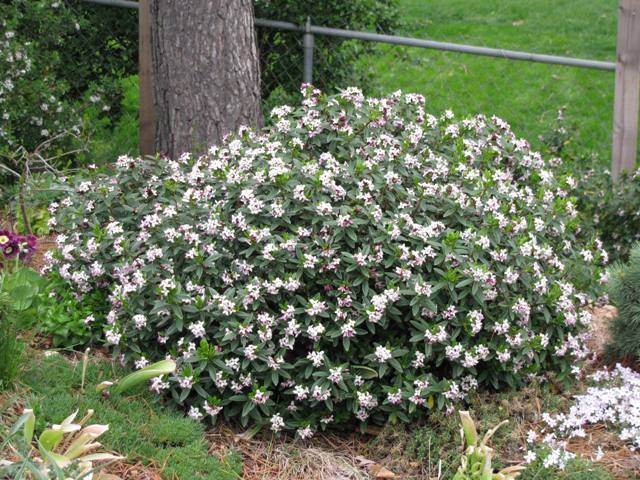OK, the flower is white and the bush is bushy. But for those of us who live in a windswept, godawful Great Plains where the wind whistles and only a few, threadbare strands of barbed wire separate us from the Arctic blasts (I did not make this up, btw), the seemingly subtropical luster of evergreen leaves on this munchkin are as evocative of warmth as Gardenias in Grenada.
I can't resist showing off my champion plant of this, perched on top of my very exposed rock gardeen where it seems to do very well. Alas! Each fruit has a single seed--and it takes forever to gather a handful of the plump berries. So I never have quite enough seed to do the trick.
Although one local nurseryman has had good luck with cuttings...I have grown a half dozen "retusa" and "tangutica" over the years--each different a bit from one another, and yet all with a close family resemlance. All seem to be tough as nails and worth a spot in the large rock garden.


Comments
Todd Boland
Re: Daphne retusa: lustrous and lusty!
Fri, 02/19/2010 - 4:37pmI have what I got as a retusa but I think it may be tangutica...does very well here but my plant is now too leggy and needs to be re-propagated.
Panayoti Kelaidis
Re: Daphne retusa: lustrous and lusty!
Sat, 02/20/2010 - 9:33amLooks just like what I grow as D. retusa: my original D. tangutica which lasted almost 25 years and got almost 4' tall came from Siskiyou Rare Plant Nursery and had somewhat narrower, more pointy leaves. I miss it very much: maybe they still have some tucked away somewhere. My "retusas" tend to have thicker, more oval and darker leaves just like what your's shows...I guess they are all closely allied (tangutica presumably being a more northerly outlier).
Todd Boland
Re: Daphne retusa: lustrous and lusty!
Sun, 02/21/2010 - 2:31pmWell maybe I'll have to change my label back to retusa..the fact that the more 'tender' of the two is doing so well fills me with some pride that I'm successful with it in Newfoundland.
Michael J Campbell (not verified)
Re: Daphne retusa: lustrous and lusty!
Wed, 04/06/2011 - 10:04amA few of mine starting to flower.
Daphne Kilmeston beauty
Daphne Napollitana stasek
Daphne x Mauerbachii Perfume of Spring
Daphne Collina
Daphne Mantensiana Audrey Vokins.
Daphne Napolitana Enigma
Daphne petraea Lydora?
Daphne Rollsdorfii wilhelm Schacht
Daphne Rosy Wave.
Daphne x susannae Cheriton
Michael J Campbell (not verified)
Re: Daphne retusa: lustrous and lusty!
Wed, 04/06/2011 - 10:05amDaphne x Burkwoodii Golden treasure
Trond Hoy
Re: Daphne retusa: lustrous and lusty!
Wed, 04/06/2011 - 11:14amMichael, if this is a few, how many do you have? Do they all have a scent that fits their flowers?
Michael J Campbell (not verified)
Re: Daphne retusa: lustrous and lusty!
Wed, 04/06/2011 - 11:24amAbout 200 in pots and a few in the garden. Most of them have scent which is overpowering in the greenhouse when a lot of them are in bloom at the same time.
Trond Hoy
Re: Daphne retusa: lustrous and lusty!
Wed, 04/06/2011 - 11:46am200?? You don't need another hobby then! Except other genera ;)
Todd Boland
Re: Daphne retusa: lustrous and lusty!
Wed, 04/06/2011 - 5:22pmMust be a very fragrant coldhouse!
Trond Hoy
Re: Daphne retusa: lustrous and lusty!
Wed, 04/06/2011 - 10:15pmNo, it is a cold scenthouse ;)
Tim Ingram (not verified)
Re: Daphne retusa: lustrous and lusty!
Wed, 05/18/2011 - 5:57amI have a friend who probably grows well over 100 Daphnes - he is on very good terms with Robin White! My two all time favourites are retusa and odora, both of which make superlative garden plants, and odora is, I think, the best scented of all the genus. I noticed that in Robin's book it was this species that first got him hooked. (Mind you he is a bit good at growing all sorts of other plants too!).
Our specimens of bholua have suffered badly following the long cold and snowy weather before Christmas. I am hoping that if I cut them down they may regenerate from the base or the roots because they do form shoots some way from the main stem and i imagine root cuttings could be a way of propagating them. Presumably they are too tender for a lot of the States?
Trond Hoy
Re: Daphne retusa: lustrous and lusty!
Wed, 05/18/2011 - 10:40pmMy two forms of bholua froze to death last winter - and it was the root that died, not the stem or leaves which seemed to be quite healthy when the spring arrived.